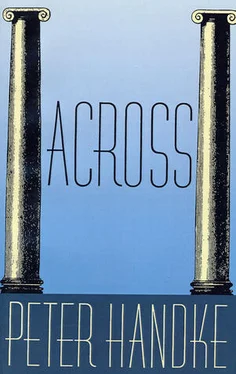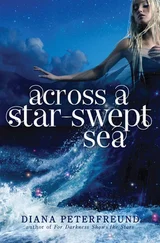Peter Handke - Across
Здесь есть возможность читать онлайн «Peter Handke - Across» весь текст электронной книги совершенно бесплатно (целиком полную версию без сокращений). В некоторых случаях можно слушать аудио, скачать через торрент в формате fb2 и присутствует краткое содержание. Год выпуска: 2000, Издательство: Farrar, Straus and Giroux, Жанр: Современная проза, на английском языке. Описание произведения, (предисловие) а так же отзывы посетителей доступны на портале библиотеки ЛибКат.
- Название:Across
- Автор:
- Издательство:Farrar, Straus and Giroux
- Жанр:
- Год:2000
- ISBN:нет данных
- Рейтинг книги:3 / 5. Голосов: 1
-
Избранное:Добавить в избранное
- Отзывы:
-
Ваша оценка:
- 60
- 1
- 2
- 3
- 4
- 5
Across: краткое содержание, описание и аннотация
Предлагаем к чтению аннотацию, описание, краткое содержание или предисловие (зависит от того, что написал сам автор книги «Across»). Если вы не нашли необходимую информацию о книге — напишите в комментариях, мы постараемся отыскать её.
Across — читать онлайн бесплатно полную книгу (весь текст) целиком
Ниже представлен текст книги, разбитый по страницам. Система сохранения места последней прочитанной страницы, позволяет с удобством читать онлайн бесплатно книгу «Across», без необходимости каждый раз заново искать на чём Вы остановились. Поставьте закладку, и сможете в любой момент перейти на страницу, на которой закончили чтение.
Интервал:
Закладка:
Since then, I’ve only once done anything comparable; that was in connection with a slogan on a church wall (though all I did then was to take out my pencil in passing and cross it out). Now, with my penknife, I removed the red-and-white trail markers — European Cross-Country Trail, Bohemian Forest — Stone Sea — Carnic Alps —from the willows on the riverbank and threw them after the wooden stands. I did the same with a birdhouse, a theater showcase, a poster advertising a recently opened hairdressing establishment, showing models that might have been portraits of wanted terrorists. Finally, with my lighter, I set fire to the gable-shape sign planted in the ground outside a house under construction, announcing that a corporation was interested in “land suitable for development” (phosphorescent letters in the darkness), and looked on as it smoldered and then really burned, along with its gable. No one was watching me, and if they had been, they might have thought they were witnessing some anonymous official act.
Never have the trunks of willow trees looked so thick to me as after that. The little wooden frames projecting over the canal, formerly emplacements for clothes washing, looked a little like docks. What had become of the boat that went with them? The wood-sheathed bed of the Alm was itself the ship, sailing past and standing still at the same time. The water didn’t flow, but stirred far and wide. The bark of the willows buckled like that of cork oaks ready to be harvested and made into life jackets. Willows go with rivers … willows rich in withes … from the withes are fashioned docks for bees … so the bees, “when blown into the water by the east wind, can climb out and spread their wings in the summer sun …”
Effective facts, or magic formulas that have lost their efficacy? A form of existence with the force of law, or nothing more than pretentious incantations? The ants which, betokening imminent showers, “carry their eggs from the anthills to safety over a narrow path”; the girls who, while spinning at night, “foresee the coming storm by the sputtering of oil in their lamp and the moldy fungus that forms around the wick”—images acting forever anew, or old ones that have lost their force? Striking, in any case, how the repetitions in current phrases usually impress me as something evil, pathological, or even criminal. Could one not, on the other hand, speak of refreshing repetition as opposed to wearisome repetition; voluntary repetition as opposed to forced repetition? The possibility of repetition as opposed to the danger of repetition? Shine for me, hard hazelbush. Glide hither, lithe linden tree. Rounded elderbush, prosper under the protection of the willows. Here is my other word for repetition: “rediscovery.”
Back home, I ate an apple in the dark; drank a glass of water; watered the plants. The bicycle stand at the bus terminus was empty now. The last bus had left for the city without passengers. The wires would crackle no more, though for a long time they swung to and fro. The moon went down — time to watch the stars. I used to attend the meetings of the Salzburg Friends of the Stars regularly. They were usually held at the top of Morzg Hill, which then was the darkest spot in the vicinity, ideal for observing the night sky. Later, as the glow of the city lights affected a larger and larger area, we moved to the more distant Gaisberg. But after a while there was no proper darkness even there; a diffuse glow veiled the starry firmament, and in the end the Friends of the Stars broke up. Nevertheless, the episode was useful to me; soon after I joined, the group leader gave me a good lesson with regard to my way of searching the sky: “You’re always in such a hurry to identify, instead of just gazing for a while.” On the other hand, I have to admit that, after observing the stars for any length of time, I’m relieved to get back to the murmuring of the trees down below.
Now that the moon was down, there seemed to be gaps in the sky: deep-black empty spaces. The great winter constellations had not yet risen. The plain down below, except for the chain of lights on the Moos highway, was almost dark; the airfield no longer glittered; the warning lights on the “city mountains” had been switched off; not even a charter plane would land now. Only the border crossing on the Autobahn would shine glaring yellow all night, and with it the not far distant, pale-white gate of the Walserfeld army post, which at first sight looked like another border crossing; when a car didn’t happen to be crossing the border, the deserted concrete road, lit from far above, could be mistaken for the army post’s execution ground. The villages of the plain had vanished in the darkness, but their supposedly Celtic names — Anif, Grodig, Morzg, Gneis, Loig, Wals, Gois — would take on life again. My son once said that those place names made him think of the names of trees.
Sounds were still heard, but all, even the short, dreamy piping of the titmice outside the window, kept their distance from one another. None had the character of a bang, a crash, a clatter, or a screech; and they sounded regularly, whether far away or in the immediate vicinity, as though reporting for duty; first the motorcycle on the Autobahn, then the refrigerator case in the supermarket; then the farm dog; and still another, high above the plain, was the distant thudding of a boulder blasted off the Untersberg by the overnight freeze and rolling down into the cirque. Each of these sounds fell into the total silence, which it further enhanced; and from the black night, in slow sequences punctuated by long intervals of silence, emerged something akin to Far Eastern calligraphy, undifferentiated black, but formally rigorous and luminous, brightening behind the lids of the man listening as he fell asleep.
But deep in the night — all sound spent, the writing long since gone — after he had suddenly started up and rushed to the window, came the pervasive suffering which canceled out everything that had gone before, and which with its endlessness exceeded even the gurgling death cry. And a cry there really was; a cry, a screaming, a shrieking. Someone is crying out. No, not someone: a child. The endless cries of a child out there, somewhere on the plain. They do not come from the immediate vicinity, but undoubtedly someone in the Colony (and far beyond, in other neighborhoods) is being wakened by them from deepest sleep, in spite of doubly closed windows and barred shutters. And now we all hear the child’s cries and hold our breath (even though in the morning we act as if nothing had happened). It’s no ordinary crying or mewling, nor is it a wordless screaming; it seems more like a call, a repeatedly bellowed two-syllable word, by which someone is being called. The child is helpless. It can do nothing but cry out that one name. It seems to be out of doors or at least in a wide-open house, unable to stir from the spot. This spot can be pinpointed. Recollecting the existence in the region of a home for so-called handicapped children comforts me only briefly. No help is possible; one can only be a witness. And the cries persist. They become so pervasive that the hundred (and more) caverns in the mass of the Untersberg — the ice caves, the tunnels, the chimneys, the clefts, the windholes — burst into a single cry hole, extending from cave to cave. Here in my room, the elusive red-scissored insect slips into the recesses of the sand ball, and in the intervals between cries a fat fly seems to thud over and over again against the windowpanes. Now the child is screaming the extreme suffering which in adults takes the form of innermost muteness; if every sufferer screamed like that, the world would have gone into a tailspin long ago. And in the natural way of things, this child will somehow have to stop crying eventually. (It has indeed stopped.) In the restored silence, the starry firmament will? will not? be restored to its proper shape. The next noise, in any case, still in total darkness, will be the reliable clatter and bumping of the garbage trucks. But I’ll have been a witness nonetheless: I’ll have seen how, for the duration of those cries, Birch Street, Fir Street, Willow Street, all the streets of the Colony, had only a single name — Nameless Street.
Читать дальшеИнтервал:
Закладка:
Похожие книги на «Across»
Представляем Вашему вниманию похожие книги на «Across» списком для выбора. Мы отобрали схожую по названию и смыслу литературу в надежде предоставить читателям больше вариантов отыскать новые, интересные, ещё непрочитанные произведения.
Обсуждение, отзывы о книге «Across» и просто собственные мнения читателей. Оставьте ваши комментарии, напишите, что Вы думаете о произведении, его смысле или главных героях. Укажите что конкретно понравилось, а что нет, и почему Вы так считаете.












